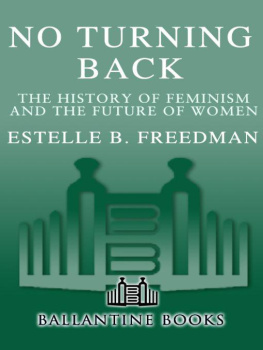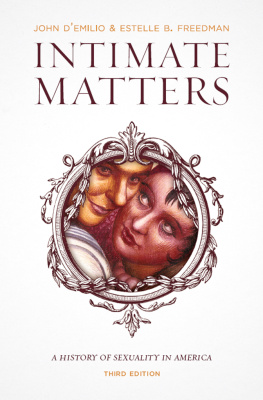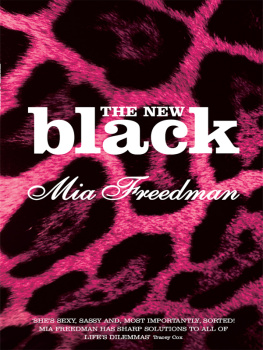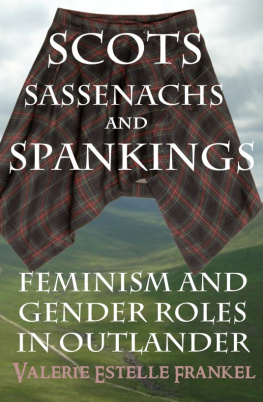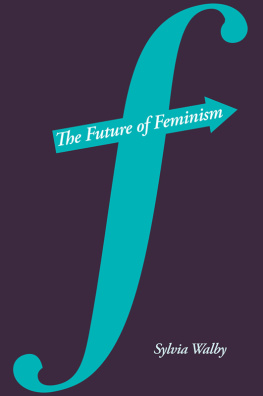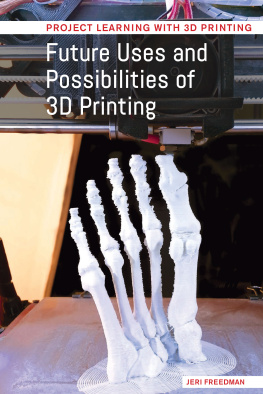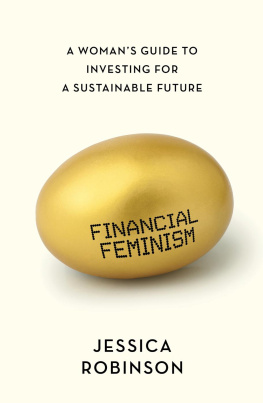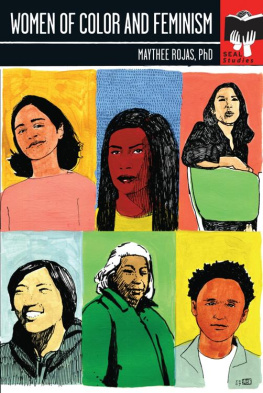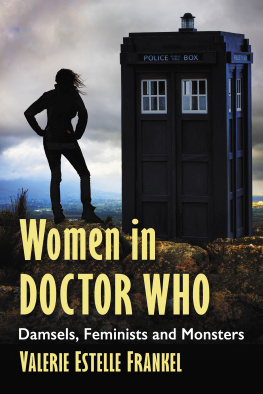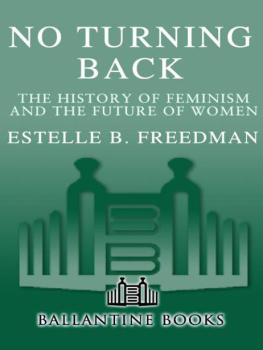Estelle B. Freedman - No Turning Back: The History of Feminism and the Future of Women
Here you can read online Estelle B. Freedman - No Turning Back: The History of Feminism and the Future of Women full text of the book (entire story) in english for free. Download pdf and epub, get meaning, cover and reviews about this ebook. publisher: Ballantine Books, Random House Publishing Group, genre: Home and family. Description of the work, (preface) as well as reviews are available. Best literature library LitArk.com created for fans of good reading and offers a wide selection of genres:
Romance novel
Science fiction
Adventure
Detective
Science
History
Home and family
Prose
Art
Politics
Computer
Non-fiction
Religion
Business
Children
Humor
Choose a favorite category and find really read worthwhile books. Enjoy immersion in the world of imagination, feel the emotions of the characters or learn something new for yourself, make an fascinating discovery.
- Book:No Turning Back: The History of Feminism and the Future of Women
- Author:
- Publisher:Ballantine Books, Random House Publishing Group
- Genre:
- Rating:4 / 5
- Favourites:Add to favourites
- Your mark:
- 80
- 1
- 2
- 3
- 4
- 5
No Turning Back: The History of Feminism and the Future of Women : summary, description and annotation
We offer to read an annotation, description, summary or preface (depends on what the author of the book "No Turning Back: The History of Feminism and the Future of Women " wrote himself). If you haven't found the necessary information about the book — write in the comments, we will try to find it.
No Turning Back: The History of Feminism and the Future of Women — read online for free the complete book (whole text) full work
Below is the text of the book, divided by pages. System saving the place of the last page read, allows you to conveniently read the book "No Turning Back: The History of Feminism and the Future of Women " online for free, without having to search again every time where you left off. Put a bookmark, and you can go to the page where you finished reading at any time.
Font size:
Interval:
Bookmark:

Table of Contents
[A] VERY READABLE, COMPREHENSIVE HISTORY. The Seattle Times
Freedman has accomplished the impossiblea brilliant synthesis of feminist scholarship and activism, truly interdisciplinary and transnational. Her lucid analysis of the past and future role of womens movements is inspiring and empowering.
GERDA LERNER
Historian and author of Women and History and Why History Matters
Freedman brings alive the story of a global revolution, spanning centuries and cultures, with lively writing and spirited scholarship.... The accessible writingtracing feminism from prehistoric societies through todaysparkles with a keen understanding.... Its thoughtful, user-friendly approach invites readers to think about how girls and women are treated.
San Jose Mercury News
[An] illuminating analysis... The scope of this book is enormous.
London Economist
[ No Turning Back ] serves as a reminder of how far womenin this country and abroadhave come in their efforts to gain equality and how much work still needs to be done.
Palo Alto Weekly
Please turn the page for more reviews....
ELOQUENT... THE BOOK IS GLOBAL IN ITS REACH.... [A] COMPELLING AND INSPIRATIONAL ACCOUNT. Charleston Post & Courier
Compelling and surprisingly easy to read... Freedmans emphasis on global experiences and progress, and her use of examples and stories of individual women from villages in Africa to urban areas in the United States, brings concepts to life.... Freedmans skill in making complex material readable is evident, as is her passion for the subject.
St. Louis Post-Dispatch
[A] rigorous work that not only stands as an excellent primer on the current state of feminism, but also includes a historical perspective for content.... With an accessible writing style and obvious love for her subject, Freedman has penned a major work that fits well both in the classroom and on the bedside table.
Publishers Weekly
A welcome and stimulating overview that connects the modern feminist movement not only to its own past, but to global struggles for economic and social justice.
Kirkus Reviews
No Turning Back is a model of how to write global history.
Womens Review of Books
For my students
PREFACE
Like each of the books I have written, this one began with a question that I could not answer. Several years ago a woman whom I admire asked me to recommend one book that she could read to learn about feminist scholarship. At first it seemed like an easy enough request. I had been reading widely in the interdisciplinary womens studies literature since 1970, the year I entered graduate school in U.S. history and first defined myself as a feminist. Now I taught a course called Introduction to Feminist Studies and chaired the Program in Feminist Studies at Stanford University. As I began to name my favorite books, though, I realized that no one selection fit the bill. My choices tended to be studies of womens history or important theoretical works in other disciplines that would not necessarily appeal to a nonacademic reader. Neither a textbook nor an anthology of short essays, such as those I assign in class, would do the trick either. I eliminated one possibility after another until I realized that no single book brought together the interdisciplinary literature that the past generation of feminist scholars has produced. Unable to fulfill her request, I jokingly said that I would have to write that book myself.
Our conversation that evening and my mental review of the literature stuck in the back of my mind as I finished another book and continued to teach Introduction to Feminist Studies. The course has been an education for me, not only because I must reach beyond my training as a historian to incorporate other disciplines but also because the material can have such a profound impact on students and teacher alike. Each time I enter the classroom, and whenever I witness the intellectual and personal growth that takes place there, I recall a definition I heard in the late 1970s that womens studies is the educational arm of the feminist movement. My classroom is neither polemical nor overtly political, but by providing a space for rethinking how we treat women, teaching represents my personal contribution to feminism. I began to wonder if I could transpose this educational experience from the classroom to a book that would reach a wider audience.
I had a personal stake in writing about the history of feminism and its contemporary impact, for it allowed me to think back on my own education, particularly the way my consciousness as a woman has changed over the decades. Working with college students, I often recall myself as a sophomore at Barnard College in 1966. I wanted nothing to do with womens movements or womens history. When my advisor, Annette Baxter, suggested that I enroll in her course on U.S. womens history, I had the nerve to reply that I would rather study real history. How swiftly times changed during that decade. Just two years later, my values shaken by the antiwar and student movements, I was questioning all of my old priorities. Working in Japan for a summer, I gained a more critical perspective on my own culture. Determined to apply my education to social change, I saw few clear paths beyond the then limited conventional expectations for young women. I was ripe for feminist analysis. As a senior, I was disappointed to learn that womens history would not be offered that year, but as I wrote my honors thesis on African American history I also began reading about Emma Goldman and other radical women.
After graduation, a job in a social justice project that held few opportunities for women contributed to my growing feminist consciousness. It was 1970, and someone gave me a set of mimeographed radical feminist essays that would become Notes from the Second Year . They began to change my life. I eagerly sought ideas that could explain the contradictions between my aspirations and my options, between my generations goals of peace and love and the violence that pervaded our culture. Reading books such as Doris Lessings The Golden Notebook , Simone de Beauvoirs The Second Sex , and Kate Milletts Sexual Politics threw open to debate all of my prior training as a nice Jewish girl. I was taking myself seriously in new ways and expecting others to do the same. By the time I started graduate school I needed to know why feminism had taken so long to reach me and how it could be sustained in the future.
Feminism unleashed my intellectual energies. It also made me appreciate the women in my life in new ways, valuing their friendship and love, respecting their choices, and admiring their struggles. Womens caucuses at Columbia University, the early Berkshire Conferences on womens history, and local womens studies gatherings sustained me as I pursued a doctorate at a university that remained unwelcoming to women. Reading Gerda Lerners early historical writing, Angela Davis on slave women, and later Susan Brownmillers analysis of the history of rape supplemented my formal graduate training. In the burgeoning womens culture of the 1970s I found music, poetry, and theater that fed my soul as well as my intellect. By the time I finished graduate school, womens history had become a passion as well as a profession.
Once I began teaching, undergraduates asked me to offer my first feminist courses, on U.S. womens history and on women in Third World revolutions. With other women faculty I formed reading groups on interdisciplinary feminist scholarship and worked to launch womens studies programs at Princeton and then at Stanford. In the San Francisco Bay Area after 1976, local study groups on sexuality and on socialist feminism, the grassroots Lesbian and Gay History Project, and the creative and political writing by diverse women of color all transformed my own feminism from its middle-class, East Coast origins to a broader and more diverse political entity. My historical research on womens social reform movements would reflect these concerns. I wrote my dissertation and first book, Their Sisters Keepers (1981), in response to a question about the origins of separate prisons for women in the United States, and I pursued the subject in Maternal Justice (1996), a biography of Miriam Van Waters. Writing about the history of sexuality with John DEmilio in Intimate Matters (1988), and in my own essays on lesbian history, I repeatedly asked how gender, race, and class hierarchies have shaped sexual meanings. All of these experiences eventually led me to take on the introductory course in feminist studies.
Font size:
Interval:
Bookmark:
Similar books «No Turning Back: The History of Feminism and the Future of Women »
Look at similar books to No Turning Back: The History of Feminism and the Future of Women . We have selected literature similar in name and meaning in the hope of providing readers with more options to find new, interesting, not yet read works.
Discussion, reviews of the book No Turning Back: The History of Feminism and the Future of Women and just readers' own opinions. Leave your comments, write what you think about the work, its meaning or the main characters. Specify what exactly you liked and what you didn't like, and why you think so.

